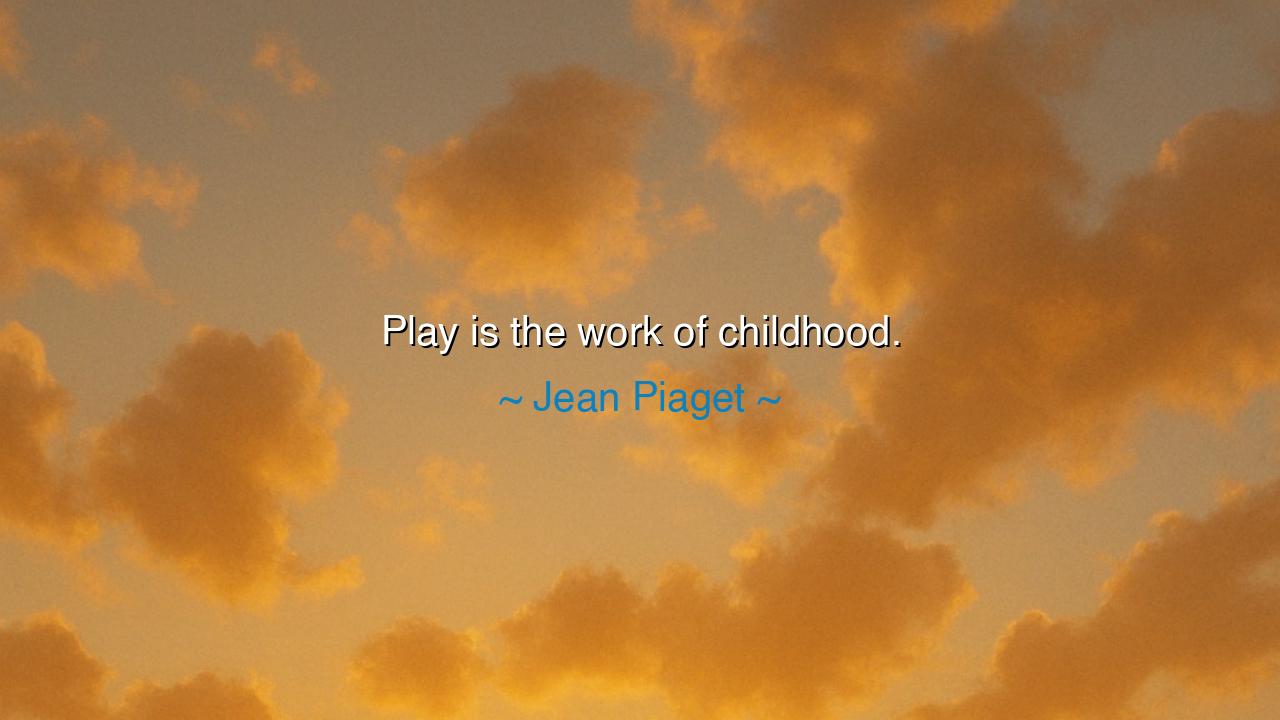
Play is the work of childhood.






The great thinker of children’s minds, Jean Piaget, once declared: “Play is the work of childhood.” In this brief yet profound saying, he unveils a truth that many overlook—that the laughter and games of the young are not idle distractions, but sacred labor. For through play, the child builds the foundations of wisdom, shaping thought, emotion, and spirit as surely as the blacksmith shapes iron upon the anvil.
To the unseeing eye, play may seem but frivolity: the chasing of shadows, the building of castles that crumble with the wind. Yet Piaget, as a patient observer of the young, knew that within these acts lies the hidden work of growth. In the stories children invent, they learn imagination; in their quarrels and reconciliations, they discover justice and compassion; in their games, they practice the laws of cooperation and freedom.
Childhood is the season of sowing, and its soil is tilled by play. Just as the farmer would never scorn the small seed because it is not yet a harvest, so too must we not despise the child’s games. For every puzzle solved, every tower toppled and rebuilt, every rule followed or broken, is the silent crafting of the adult-to-come. Thus, the work of childhood is hidden in laughter, yet more enduring than stone.
The ancients themselves understood this mystery. Did they not teach through stories, fables, and riddles, turning learning into a kind of play? So too does the child approach the world: not with textbooks and laws, but with curiosity, trial, and delight. In this way, the mind is awakened not by command, but by discovery.
Therefore, let this truth endure: cherish the play of children, for it is no waste, but their holy work. Through it, they fashion the tools of thought, the virtues of the heart, and the courage to face the world. To honor childhood is to honor play, and to honor play is to recognize in it the first labor of wisdom.






TKNguyen Thanh Kien
This quote really resonates with me because it’s a reminder that play is vital for children’s development, even though we often overlook it. We tend to focus on academic skills and early education, but are we missing out on teaching life skills through play? How can parents and educators ensure that children have enough space to engage in play that fosters both learning and emotional growth?
BHPham Nguyen Bich Hau
I really appreciate how Piaget captures the essence of childhood through the concept of play. It reminds me that play isn’t just entertainment, but a critical tool for learning and understanding the world. How can we, as a society, create more environments that allow children to play freely, where they can learn social skills, creativity, and problem-solving in a natural way?
NHNguyen Hoang
Piaget’s quote makes me reflect on how we as adults sometimes forget the importance of unstructured time. In a world full of activities and schedules, do we let children experience enough freedom to play and explore? Is there a risk that the pressure to perform academically too early might stifle their creativity and problem-solving skills?
HHong
Piaget’s insight on play highlights how essential it is to a child's growth. I wonder though, how does play evolve as children grow older? Is play just as crucial for older children and teenagers, or does it change in form? And what happens when children are deprived of play due to societal or academic pressures—how might that affect their development?
GHBap Gia Huy
I love how Piaget frames play as the ‘work’ of childhood. It shifts the perspective from seeing play as just an activity to recognizing its importance in shaping a child’s development. But does this mean that adults should continue playing too? If play is so essential for children, how can we make time for it as adults without feeling guilty about it being unproductive?